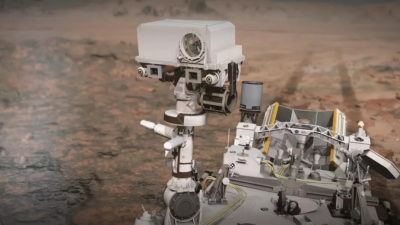SPACE — NASA’s Mars rover, Perseverance, has discovered that sound travels much slower on the Red Planet than on Earth. Sound also behaves in some unexpected ways that could make communication on the planet very strange.
Sound waves travel more slowly through the Martian atmosphere than on Earth. This makes sense, because the speed of sound depends on the density of the material the sound wave travels through, including temperature. In Earth’s atmosphere, at 68 degrees Fahrenheit (20 degrees Celsius), sound travels at 1,125 feet (343 meters) per second, but in much denser water, sound travels at 4,856 feet per second (1,480 meters per second). .
according to Science Alert, Mars’ atmosphere is 100 times thinner than Earth’s, so sound travels much slower as it travels through it. It travels at just 787 feet per second (240 meters/second). But NASA’s Perseverance rover, which landed on the Red Planet in February 2021, has discovered some other oddities about sound on Mars that scientists didn’t expect.
Scroll to read
Scroll to read
In a new study presented at the 53rd Lunar and Planetary Science Conference earlier this month, a team of scientists from Los Alamos National Laboratory, a US Department of Energy facility in New Mexico, measured sound using the microphone on Perseverance’s SuperCam instrument. It revealed that high-pitched sounds travel faster on Mars than lower-pitched sounds.
Scientists say this strange behavior can be explained by thermal fluctuations in the first 6 miles (10 kilometers) of the Martian atmosphere above the red planet’s surface. During the day, when sunlight shines on and warms Martian rock, convective winds and turbulence stir the Martian air layer, also known as the Planetary Boundary Layer. The mixture changes the behavior of the carbon dioxide molecules. Mars’ atmosphere contains 96 percent carbon dioxide, but the atmospheric pressure there is very low. In comparison, Earth’s much denser atmosphere contains only 0.041 percent carbon dioxide.
“Due to the unique nature of carbon dioxide molecules at low pressure, Mars is the only terrestrial planetary atmosphere in the solar system that experiences a change in the speed of sound right in the middle of the audible bandwidth (20 Hertz to 20,000 Hertz),” the researchers wrote in the paper. presented at the conference.
“At frequencies above 240 Hertz, the active vibrational mode of the collisions of carbon dioxide molecules doesn’t take long to return to their original state,” the researchers said. This results in sound waves at higher frequencies traveling more than 32 feet per second (10 meters per second) faster than lower frequencies.
That means, if you’re standing on Mars, listening to music from afar, you’ll hear the high-pitched sounds first, before you hear the lower ones, even if the low notes come out first. The research team plans to continue using SuperCam’s microphone data to observe how things like daily and seasonal variations can affect the speed of sound on Mars. They also plan to compare acoustic temperature readings with readings from other instruments to try to figure out fluctuations.
Source: Space.com
-“).attr({
type: ‘text/javascript’,
src: ‘https://platform.twitter.com/widgets.js’
}).prependTo(“head”);
if ($(“.instagram-media”).length > 0)
$(”


